Now Hotel Interview Series
The Commercial Interior Designers and Suppliers who read Design Insider regularly will know that we consistently publish new product launches, interviews and case studies which focus on the hospitality sector and, although over recent years it has not been a smooth journey for the hospitality sector, there is much to celebrate!
There are new design and operational concepts being thoughtfully explored which deliver experiences requested by hotel guests and there are initiatives which progressively address sustainability, employee wellbeing and the integration of new technology.
This interview series consists of 5 in depth interviews, brought together in summary within this cover article. Thank you Holly Hallam, John Williams, David Lawrenson, Colm Mac Rory and Amal Yusuf for spending your valuable time with us. Together we aim to paint a clear picture of where the hotel sector is now and where it could be in the future.
Enjoy the full Now Hotel Interview Series here
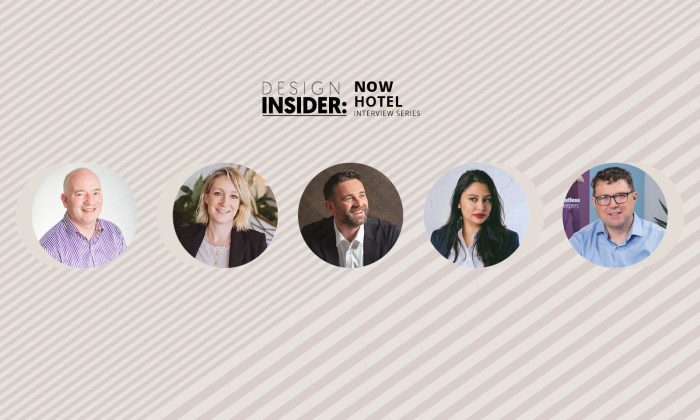
Each commercial industry leader was asked the same set of questions in order to learn from their experience within the hospitality sector, specifically looking at hotels, including the aspects which we should be celebrating, the challenges we are facing, the topics of conversation which need to be progressed and what the future may bring.

Holly Hallam, Managing Director at DesignLSM
We began by asking our interviewees to introduce themselves, Holly Hallam, Managing Director at DesignLSM, gave an insight into her role within his team:
‘Since joining the team seven years ago, I’ve been responsible for leading the business into new territories; spearheading and driving the studio’s strategy service and creating unique consumer engagement ideas for DesignLSM’s vast array of clients. I’ve overseen fantastic creative projects across the globe, including the likes of Argentinian restaurant group Gaucho’s growth across the UK, North Audley Cantine’s expansion to the Middle East and most recently, the delivery of a monumental transformation of Heythrop Park Hotel, a 337-key Grade II* listed country house hotel.’
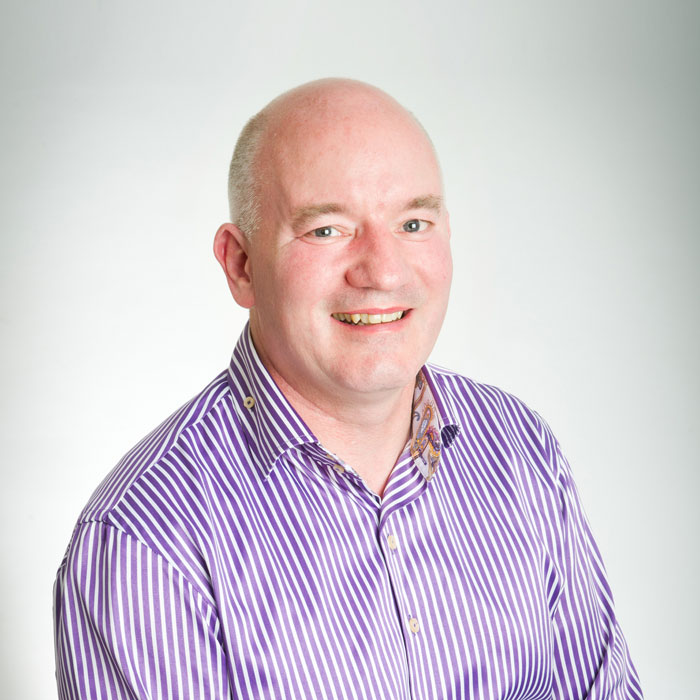
Colm Mac Rory, Founder and Managing Director of Spires Art
Colm Mac Rory, Founder and Managing Director of Spires Art, outlined how his team work with their clients:
‘We provide the same professional approach whatever the scale of the project and pride ourselves in working closely with all our clients to make sure we reach the objectives of the initial brief and follow through the creative process from concept to completion.’

David Lawrenson, Sales Director at Silentnight Group
We wanted to being our interviews on a very positive note and so asked what the key things are that can be celebrated right now? David Lawrenson, Sales Director at Silentnight Group began by praising the sector for it’s post pandemic adaptability and went on to highlight a aspect of the hotel sector which is especially important to suppliers of mattresses and beds:
‘Encouragingly, the industry is increasingly recognising the role that sleep can play in delivering a great guest experience by working with suppliers that can also help their ESG footprint and their guests sense of well being.’
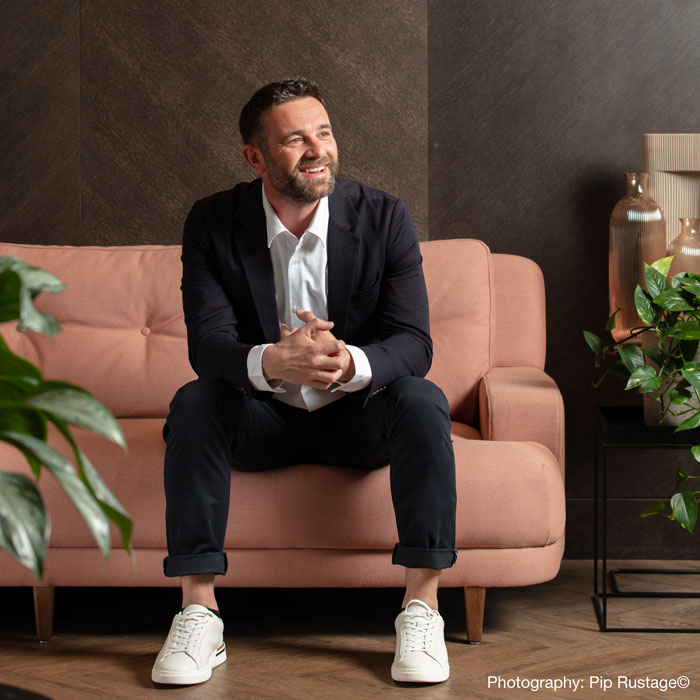
John Williams, Founder & Director at SpaceInvader
John Williams, Founder & Director at SpaceInvader, brought a section of the sector to our attention which we have not previously looked at in detail:
‘For me, some of the most exciting work is happening at the top end of the mid-level lifestyle sector right now. In a way, both the luxury and value sectors have a degree of constraint in terms of both customer and operator expectation, whilst the lifestyle sector is very receptive to – and a showcase for – contemporary thinking.’
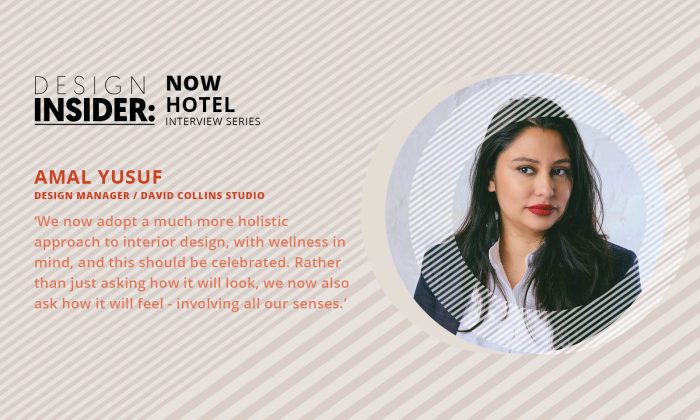
Amal Yusuf, Design Manager at David Collins Studio spoke about the positive change in the studios design approach:
‘We now adopt a much more holistic approach to interior design, with wellness in mind, and this should be celebrated. Rather than just asking how it will look, we now also ask how it will feel – involving all our senses.’
When answering this question Holly Hallam mentioned this importance of technology, a thread which you will see run through many of our interviewees upcoming answers:
‘What’s impressive is how businesses have embraced innovation and technology like never before. They’ve undergone digital transformations that have not only improved guest experiences but also streamlined their operations. The result? A more seamless and personalised hospitality experience for all.’
Although at Design Insider we try and keep a positive outlook it is important to discuss challenges in order to find solutions which enable is to fly over these hurdles. When we asked our interviewees what hurdles are currently stalling the hotel sector’s growth many of our experts spoke about the impact of Brexit and the war in the Ukraine. David Lawrenson provided statistics which help us put he sector into content:
‘The UK hospitality sector is comprised of approximately 143,000 businesses, employs around 1.8 million people and, in 2019, generated £40.4 billion. As well as providing jobs and contributing to the economy. hospitality plays a vital role at the heart of communities up and down the country, giving a welcoming space for people to come together and so finding partners who can help to address some of the above issues is vital.’
Colm Mac Rory also spoke about staff shortages:
‘The ongoing COVID-19 pandemic continues to cast a shadow. Additionally, the industry grapples with labour shortages, making it challenging to maintain adequate staffing levels and provide quality services. The lack of skilled workers, coupled with changing workforce demographics and increased competition for talent, exacerbates this issue.’
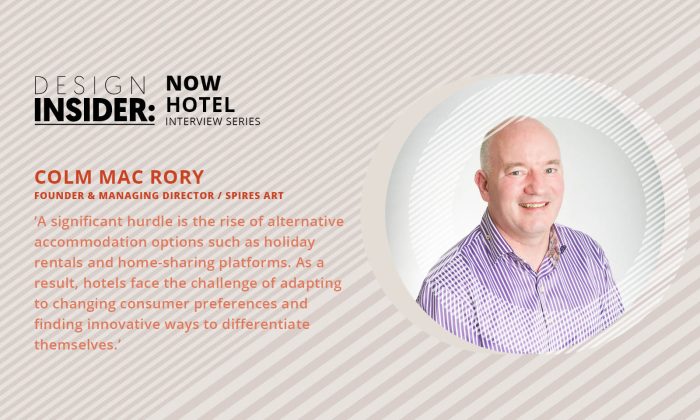
He then continued his answer to cover the hurdle of the rise of alternative accommodation options such as holiday rentals and home-sharing platforms.
‘These alternatives offer unique experiences, competitive pricing, and a sense of authenticity that traditional hotels struggle to match. As a result, hotels face the challenge of adapting to changing consumer preferences and finding innovative ways to differentiate themselves.’
One particularly interesting solution to staff shortages was offered by Holly Hallam:
‘If restaurants and hotels want to thrive in the long run, they need to focus on and improve their recruitment, training, and retention strategies. Collaborating with charities like The Right Course can bring benefits to businesses. This inspiring organisation, in particular, provide training opportunities, job placements, and support for prison inmates that are determined to build a more positive future for themselves upon their release. This collaboration not only helps address workforce shortages within the industry but also contributes to social responsibility, reducing the rates of re-offences, and strengthens the community.’

Amal Yusuf, Design Manager at David Collins Studio
Amal Yusuf highlighted two important hurdles:
‘In my experience, the hurdles are always the same – budgets and timelines. It often involves an element of educating the client on the feasibility of their aspirations in relation to project budgets.’
In our previous interview series we spoke with industry leaders about sustainable innovation and it is no surprise that sustainability was a conversation which our interviewees thought was key. John Williams summarised:
‘I’m delighted to say that they’re around sustainability and wellbeing. These are concerns that have penetrated really deeply into the industry and it’s all the better for it. We’re seeing this at all levels of hotels, by the way, which is great, looking at everything from the consumption and re-use of water to end of life scenarios for all products and stricter embedded carbon targets.’
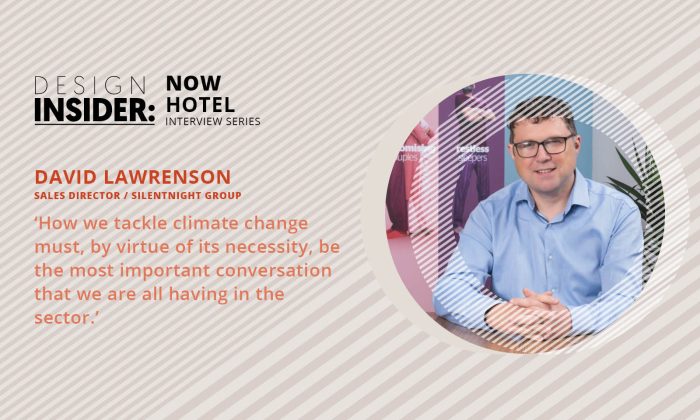
David Lawrenson agreed:
‘How we tackle climate change must, by virtue of its necessity, be the most important conversation that we are all having in the sector.’
Technology was another topic of conversation highlighted by Colm Mac Rory:
‘Another significant topic is the integration of technology and artificial intelligence (AI) in enhancing the guest experience. The industry is exploring innovations such as chatbots, virtual reality (VR), and smart room features to personalize services, streamline operations, and provide seamless interactions for guests. However, concerns related to data security and privacy are also being debated, as the sector grapples with finding the right balance between personalization and protecting customer information.’
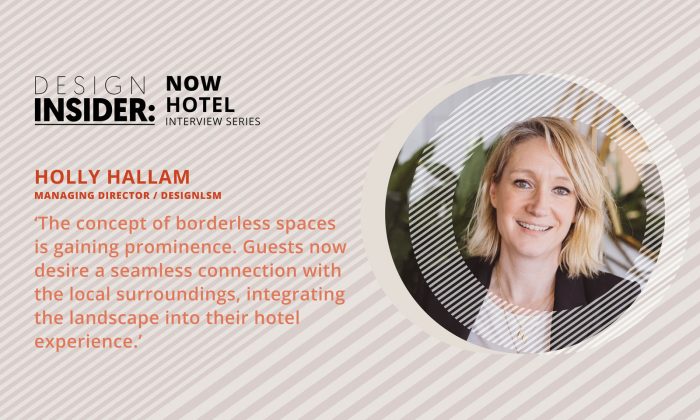
Holly Hallam mentioned a concept which was new to us, that of borderless spaces:
‘The concept of borderless spaces is gaining prominence. Guests now desire a seamless connection with the local surroundings, integrating the landscape into their hotel experience. In response, hotels are considering the needs of the community and maximising the use of local suppliers and producers, aiming to provide an authentic and immersive experience for guests.’
As this series demonstrates it is vital to learn from others, and so we wanted to know who the people are who are currently making waves in this sector? John Williams jumped in with some fantastic suggestions:
‘The Lore Group is always doing interesting things from a regeneration point of view. Their choice of buildings also naturally opens doors for good design narratives.
In design terms, I love to see the hotel sector’s infinite capacity for the interplay of art, texture, light, colour and form. Spanish designer Jaime Hayon’s Battersea art’otel is a particularly good recent example.’
More generally David Lawrenson spoke about the leading role, and potential, of technology:
‘I do feel that those who are at the vanguard of tech and sleep developments really could bring some significant value to Hospitality over the next few years.’
Amal Yusuf spoke about the exciting rise in refresh projects:
‘Recently we have worked on several ‘refresh’ projects within hotels. This allows us to inject fresh ideas, whilst working with small budgets – and whilst hotels remain open.’
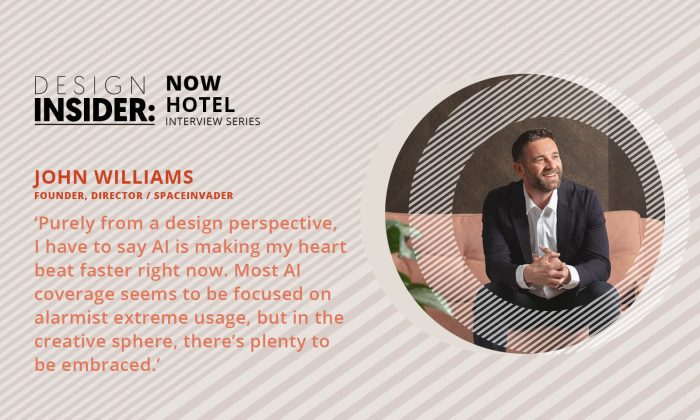
We finished our interviews, as we always do, looking to the future and asked: What is on the horizon for the hospitality sector which makes your heart beat faster? We were excited by John Williams’ positive outlook on the role of AI:
‘Purely from a design perspective, I have to say AI is making my heart beat faster right now. Most AI coverage seems to be focused on alarmist extreme usage, but in the creative sphere, there’s plenty to be embraced. As we design a concept and investigate and research a ton of different avenues, we’re finding AI can often suggest something unexpected or even a totally new dimension.’
Colm Mac Rory told us how the rise of experiential travel excites him:
‘Another aspect that excites me is the rise of experiential travel. Modern travellers seek immersive and authentic experiences, and hotels are responding by offering unique activities, cultural exchanges, and local partnerships. From culinary workshops to adventure tourism, the hospitality industry is evolving to cater to these evolving demands, enriching the travel experience.’
And, Holly Hallam finished our interview again highlighting the substantial role technology will play in the hotel sector:
‘One key area of interest is the emergence of new technologies, which are set to bring about substantial transformations. From artificial intelligence to augmented reality, these innovations have every potential to enhance guest experiences beyond the physical hotel stay.’
What is clear from this selection of interviewees is that the designers and suppliers working in the hospitality sector thoroughly understand the challenges they fact and are armed with exciting tools, including new technology, to enable the sector to succeed and flourish.
You can enjoy each of our interviews in full by selecting the links below:
Holly Hallam, Managing Director at DesignLSM
John Williams, Founder & Director at SpaceInvader
Colm Mac Rory, Founder and Managing Director of Spires Art
David Lawrenson, Sales Director at Silentnight Group
Amal Yusuf, Design Manager at David Collins Studio




